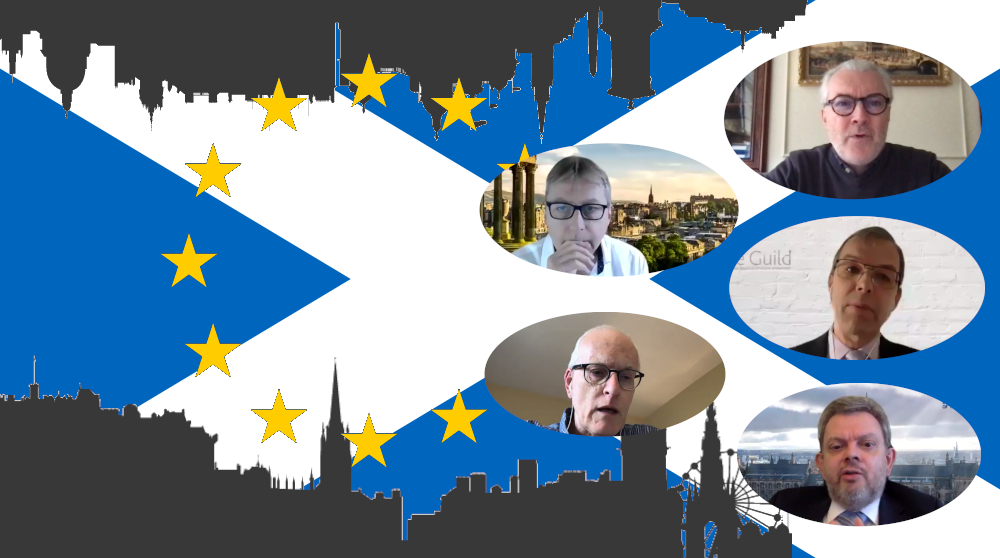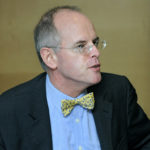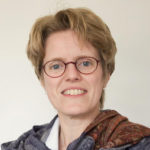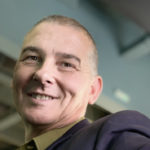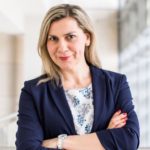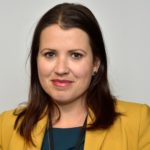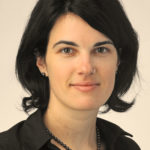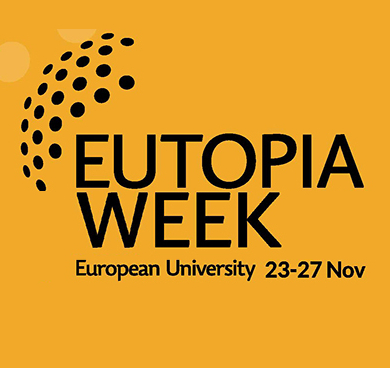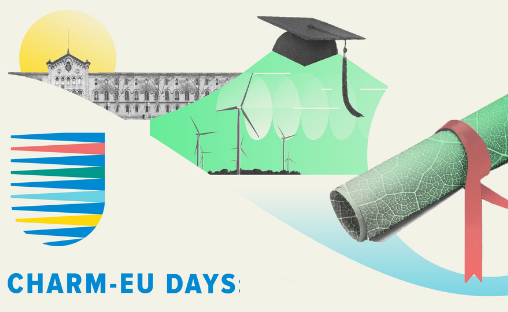Well, let’s come back to a city not so far from Berlin, to Potsdam. We are being joined by our fourth participant in the first part of this panel discussion. It is Nadine Shovakar. She is a project coordinator for EDUC, the Alliance for the Digital European UniverCity. It is a word game, university as a “city,” exactly. It’s very nice. Nadine, on your career path, you are coming from the Austrian University Conference, the association of Austrian universities. And from there then you joined in Potsdam the European University Alliance. You made a step from Austria to Berlin or to Potsdam, to be precise. What were the first news that you noticed when you arrived, workwise?
Nadine Shovarkar I was going to say, how the food has changed, but yes, I’ll concentrate on the work. Welcome from my side also. As Tino was saying, I am Nadine and I work for EDUC, the European Digital UniverCity. What was new here? Of course, I mean, the biggest change, I would say compared to the Rectors conference, is that now I work at one university, I mean, as in the European project. But it is a different kind of institution than the Rectors conference. That was probably the first impression. I was welcomed very, you might say, French, we had a coffee first and some croissants with the Vice President, professor Schweigert. We are also coordinating the EDUC Alliance, professor Schweigert is the leader in that sense. And we had a nice breakfast with the head of the international office, my fellow project manager, Dr. Katja Jung. And I think, his strategic advise was also there. So this was my very first impression. And then, of course, the beautiful campus of the University of Potsdam. So but these are like my feelings. So it was a very nice start, I have to say.
Well, I am calling from here from the suburb of Potsdam, which is Berlin, to hear what is going on in the capital of Brandenburg. We have been talking about your job and your challenges, your task that you have now as a project manager of EDUC. One key word that has come up with change management. So, apparently what you are doing is communicating and project planning in order to change something. How would you describe this kind of work and in particular for the Alliance?
Nadine Shovarkar First of all, you know, nobody likes change, in general. And this is a very big change management project. Actually it is a project that is supposed to be a structure later. We have like different lines of our development. One is to bring it from project to structure. The other one is to ‘talk for institutional change,’ as I would call it. So we are trying to find allies within all of our six institutions. Basically, we are trying to reach out and connect to as many people as possible. And as I was saying, nobody likes change, that’s true. However and luckily, the European Universities Initiative – I found at the University of Potsdam and also at our partners generally – has a very positive notion and positive feeling. So people are generally willing to be part of it. Then, of course, the next personal sort of feeling that I got is that everybody likes change when it is just like – “Oh, you were joking before! Yeah, let’s do that in European level, which means let’s take my way and make it European.” [laughs] So the real change is to profoundly talk. And that is also the part that takes time, to actually get to know each other and to see processes and to learn from each other, and then to possibly, in an efficient way, change processes, or align processes, or to see what you can do together. So we are working on all different levels, as Katrine was saying, within the university. We are going from the Senate, the President’s office. We are going to meet the students, we had a Facebook event to engage with them. We are also collaborating with staff on very different levels. The research office, like all sorts of different actors within the university, where, of course, as change agents, we are always trying to reach the ones who are willing, the ones who are already interested, and they help us. Because alone you can’t do anything and you don’t want to, also because it has to become a project of the university that the people want. You can’t come top-down and say, I want to change this for that. It has to come from within the university, which is, of course, always a balance of top-down. You come with ideas, you discuss with people.
Certain things will come from bottom-up as an example, maybe to not just talk in general terms. On Monday, yesterday, we launched a call for research seminars or workshops, which means that within the Alliance we have seven research topics and we are trying to find doctoral candidates and researchers to join and see what project they can develop within a week. These are very broad topics, like health, or European studies. So we are, on the one hand, within the Alliance, sort of in a top-down, but very broad way, deciding on these research topics, of course, keeping the university strategies in mind so it doesn’t come from nowhere. But then on the other hand, we send out a call to every researcher at the university to try to reach everybody and give everybody the possibility to partake, if they want to. Then at the same time, of course, like talking of the change agents or those who are motivated. We are also talking individually to those professors who are already very pro-Europe, very much like always into international projects. We always have sort of a approach to trying to include everybody and of course, trying to identify people who are especially eager to to contribute to this idea. So this is just one example of how we are trying to bring about the change.
One technical term that always came up also with the other participants of our panel, is the term challenge-based. Apparently the European Commission has written it into the programme, but it would be interesting to know more what this actually means.
Nadine Shovarkar Yes, we are talking again about institutional change. We are trying to come from a few professors in each institution who already work like that, who are trying to get challenges from the society – it could be from companies, could be from NGOs, could be from the wider public – into the universities and work with them in their seminars or courses or whatever it is to make it a little more systemic. We try to include these challenges into the into our learning activities.
I think the other thing that is typical for the European Universities or special about it is that the challenge-based approach is combined with an international approach. So we have, for example, these courses, which are now often online and will later be blended. For example, University of Potsdam would have a course with he University of Rennes, the students would then also meet for one week and work on a project which ideally is a challenge. So it does combine these elements to work on concrete challenges which come from society and to also work on them internationally.
So I think that is basically the idea of the European Alliance, what makes it special. But it doesn’t mean that this doesn’t exist yet. And this is again, we are trying to connect and strengthen those people who already work like that. Because at each of our member universities, there are already people who do sort of what we do, but what is being fostered by the European Alliances. So it is nothing new it is a streamlining or an empowering process for people who work that way.
Well, there is there’s a new community of coordinators work package leaders and project officers only working for and trying to develop these European University Alliances. It is a totally new group of people working in a certain spirit and with a certain professionalism. So if you reflect upon your own, your own profession, what is special about it? Can it be defined in a job description?
Nadine Shovarkar In my personal experience, what especially is the diversity. As also Katrine was saying before, going into so many different fields and, of course, personally I am a little torn, because I don’t like the speed that comes mainly from the European Commission, like the kind of TGV train that we are on to try to bring about change. I used to work for in the (Austrian) Rectors Conference, and there are sometimes similar processes. There are 22 Austrian universities and we were trying to bring about change or have a new topic like e.g. the open publishing. Aand we would come up with a certain framework or help the universities to do it in a streamlined way within Austria. But this kind of project would go on or take maybe half a year, a year, until it comes to the working people, to processes.
So now, we are on a three year project and we are trying to see deliverables and trying to see concrete actions for very big topics. So this is also something special about the European Universities, which is also good, because the good thing is you might say the longer you talk about it, maybe nothing happens. And if you do it quickly, at least something happens. I don’t know. But this is something I feel is is special about the European alliance. Also fun as well.
Thank you for your contribution. Thanks also to the other participants, Magda, Thibaut, and Katrine. We come to the end of the first half of our talk and we have found out in what the job of project manager or a coordinator in the European University Alliance consists.
